-

新人教版高中英语必修1Unit 3 Sports and Fitness-Listening and Speaking & Listening and Talking教案
Finally, after finishing the task above, the teacher is expected to instruct students to work in groups to finish the following project:Speaking ProjectWhat event or activity would you like to invite your friend to? Make a conversation with a partner.Ski Race: Zhangjiakou, a beautiful city in northern China, will host the Youth Ski Race in December.Track Meet: a great event for track –and –field lovers on 26 October.Gym Class: come and work out at a gym! You can make it.Part 2: Listening and Talking:The teacher is advised to talk with their new students about the related topic: Boys and girls , what do you think of sportsmanship? Let’s listen and find out:Play the listening and match each opinion with the right speaker. Who do you agree with? Why?Cao Jing _____________ Lily _____________ Max _____________A. An athlete should do his/her best to win.B. The girl should stop and help the other girl. Good sportsmanship is more important than wining!C. An athlete should think about honor and his/her fans if he/she is competing for his/her country.Listen again and circle the expressions that you hear in the conversation.

新人教版高中英语必修3Unit 1 Festivals and Celebrations-Listening &Speaking&Talking教学设计
The theme of this section is “Talk about festival activities and festival experiences”.Festival and holiday is a relaxing and interesting topic for students. This part talks about the topic from the daily life of students’. In the part A ---Listening and Speaking, there are three conversations among different speakers from three countries(Japan, Rio and China), where the speakers are participating in or going to participate in the festivals and celebrations. So listening for the relationship among them is a fundamental task. Actually, with the globalization and more international communication, it is normal for Chinese or foreigners to witness different festivals and celebrations in or out of China. In the Conversation 1, a foreign reporter is interviewing a Japanese young girl who just had participated in the ceremony of the Coming-of-Age Day on the street and asking her feeling about the ceremony and the afterwards activities. Conversation 2, Chinese girl Li Mei is witnessing the Rio Carnival for the first time, and her friend Carla gives her some advice on the costumes which enables her to match with the carnival to have a good time. Conversation 3, a Chinese guide is showing a group of foreign visitors around the Lantern Festival and introducing the customs of the festival to them. The three conversations have a strong vitality and insert the festival and cultural elements from different countries. So perceiving the festivals and cultures from different countries is the second task. At the same time, the scripts also insert the targeted grammar --- v-ing as attributive and predicative, which students can perceive and experience in a real context and make a road for the further study. That is the third task. In the Part B--- Listening and Talking, the theme is “Talk about festival experience”, which is the common topic in our daily conversations. During the conversation, Song Lin, a Chinese student, asked Canadian friend Max about how to spend Christmas. In the conversation, Song Lin talked about experience and the feelings during the Chinese Spring Festival, during which there are not only some enjoyable things but some unpleasant things. After the listening, perhaps students find there are some similarities between Christmas and the Chinese Spring Festival as there are some differences in the origins and celebrations. For example, people always visit friends and relatives, decorate their houses, have a big dinner together, chat and give presents to each other.

新人教版高中英语必修3Unit 2 Morals and Virtues-Listening &Speaking&Talking教学设计
Example:One day, a poor boy who was trying to pay his way through school by sending newspapers door to door found that he only had one dime(一角)left. He was so hungry that he decided to beg for a meal at the next house.However, he lost his nerve when a lovely young woman opened the door. Instead of a meal he asked for a drink of water. She thought he looked hungry so she brought him a large glass of milk. He drank it slowly, and then asked, “How much do I owe you?” “You don’t owe me anything,” she replied, “Mother has taught me never to accept pay for a kindness.” “Then I thank you from the bottom of my heart.” With these words, Howard Kelly left that house.Years later the woman became badly ill and was finally sent to the hospital in a big city. Dr. Howard Kelly, now famous, was called in. When he heard the name of the town she came from, a strange light filled his eyes. Dressed in his doctor’s clothes, Dr. Kelly went into her room and recognized her at once. From that day on, he gave special attention to her, and decided to do his best to save her life.At last the woman was saved. Dr. Kelly asked the business office to pass the final bill to him. He looked at it and then wrote something on the side. The bill was sent to the woman’s room. She was afraid to open it because she was sure that it would take the rest of her life to pay for it off. Finally she looked, and the note on the side of the bill caught her attention. She read these words: “Paid in full with a glass of milk, Dr. Howard Kelly.” Tear of joy flooded her eyes.

新人教版高中英语必修3Unit 2 Morals and Virtues-Reading and Thinking教学设计
The topic of this part is “Learn to make choices in life”.The Listening & Speaking & Talking part aims at the moral dilemmas, and this part is about making choices in life. The heroin is Lin Qiaozhi, a famous medical scientist, made a great contribution to our country’s medical care. Most importantly, her life experience can inspire our students whether in studying or the development of career. she had moral dilemmas and life choices, which are similar to the students who will step into society. Besides, Lin has quite good virtues like kindness, self-improvement, insistence, job-loving , generosity and responsibility, which is worth being learned.Concretely, this article is a biography about Lin Qiaozhi. The article tells her whole life according the timeline, among which the life choices is emphasized. For example, whether married or chased her dream, returned home or stayed abroad, family or public, her choices all reflected her faith, spirit, responsibility and devotion.1. Fast reading to get the detailed information about Lin Qiaozhi; careful reading to do the deductive information.2. Learn the reading skills--deductive judgement according the context.3. Study the structure features and language features. 4. Communicate about Lin’s life choices and reflect their own life choices.1. Learn the reading skills--deductive judgement according the context.2. Study the structure features and language features.3. Communicate about Lin’s life choices and reflect their own life choices.Step 1 Lead in---Small talkWhat are some important life choices?Importance choices: university study, jobs and marriage partners. Because they can determine our future.

新人教版高中英语必修3Unit 2 Morals and Virtues-Reading for Writing教学设计
1. 这个寓言是一个关于一位国王古寓言。 The fable is an old fable about a king.2.作者用这个故事让读者对于社区的问题负有个人责任的必要印象深刻。The author used the story to impress upon readers with the need to take personal responsibility for problems in the community.3. 这个故事十分成功的实现了它的目的。The story was quite successful in achieving its purpose.Step 7 WritingPlease write a review of the story according the outline above.The fable is an old fable about a king who thought his people are lazy, so he put a large stone in the middle of the road and hides and waited to see if anyone will try to move it.The author used this story to impress upon readers with the need to take personal responsibility for problems in the community. The story was quite successful in achieving its purpose, and I liked it because it had a clear moral.However, while the moral of the story is clear, the actions of the king seemed pointless to me, because none of the characters in the story learnt anything. For this reason, I think there are better stories that can be used to impress upon people with the need for personal responsibility.Step 8 Pair workExchange drafts with a partner. Use this checklist to help your partner revise his/her draft.1. Does the writer give a short description of the story ?2. Does the description include the most important details of the story ?3. Does the writer give his or her opinion about the character or their actions ?4. Is the review well-organised ? 5. Does the writer use the -ing form as the adverbial correctly in the writing ?6. Are there any grammar, spelling, or punctuation errors ?Step 9 HomeworkPut up your revised draft in the classroom or read it to your class.

新人教版高中英语必修3Unit 3 Diverse Cultures-Reading for Writing教学设计
The topic of this part is “Describe a place with distinctive cultural identity”.This section focuses on Chinese culture by introducing Chinatown, whose purpose is to show the relationship between the Chinese culture and American culture. The Chinese culture in Chinatown is an important part of American culture. Chinatown is an important window of spreading Chinese culture and the spirit homeland of oversea Chinese, where foreigners can experience Chinese culture by themselves.Concretely, the title is “Welcome to Chinatown!”, from which we can know that the article aims at introducing Chinatown. The author used the “Introduction--Body Paragraph--Conclusion” to describe the people, language, architecture, business, famous food and drinks and people’s activities, which can be a centre for Chinese culture and shows its unique charm.1. Read quickly to get main idea; read carefully to get the detailed information.2. Learn the characteristics of writing and language.3. Learn to introduce your own town according to the text.4. Learn to correct others’ writing.1. Learn the characteristics of writing and language.2. Learn to introduce your own town according to the text.Step 1 Lead in ---Small talkIn the reading part, we mentioned the Chinatown of San Francisco. How much do you know about Chinatown of San Francisco ?Chinatown is a main living place for Chinese immigrants, where you can see many Chinese-style buildings, costumes, operas, restaurants, music and even hear Chinese.Step 2 Before reading ---Predict the contentWhat is the writer’s purpose of writing this text ? How do you know ?From the title(Welcome to Chinatown) and some key words from the text(tourist, visit, visitors, experience), we can know the purpose of the text is to introduce Chinatown and show the relationship between Chinese culture and American culture.

新人教版高中英语必修3Unit 3 Diverse Cultures-Reading and Thinking教学设计
Discuss these questions in groups.Q1: Have you ever been to a place that has a diverse culture ? What do you think about the culture diversity ?One culturally diverse place that I have been to is Harbin, the capital city of Heilongjiang Province. I went there last year with my family to see the Ice and Snow Festival, and I was amazed at how the culture as different to most other Chinese cities. There is a big Russian influence there, with beautiful Russian architecture and lots of interesting restaurants. I learnt that Harbin is called “the Oriental Moscow” and that many Russians settled there to help build the railway over 100 years ago.Q2: What are the benefits and challenges of cultural diversity ?The benefits: People are able to experience a wide variety of cultures, making their lives more interesting, and it can deepen the feelings for our national culture, it is also helpful for us to learn about other outstanding culture, which helps improve the ability to respect others. The challenges: People may have trouble communicating or understanding each other, and it may lead to disappearance of some civilizations and even make some people think “The western moon is rounder than his own.”Step 7 Post reading---RetellComplete the passage according to the text.Today, I arrived back in San Francisco, and it feels good (1) _____(be) back in the city again. The city succeeded in (2)_________ (rebuild) itself after the earthquake that (3)________ (occur) in 1906, and I stayed in the Mission District, enjoying some delicious noodles mixed with cultures. In the afternoon, I headed to a local museum (4)____ showed the historical changes in California. During the gold rush, many Chinese arrived, and some opened up shops and restaurants in Chinatown to earn a (5)_____ (live). Many others worked on (6)______ (farm), joined the gold rush, or went to build the railway that connected California to the east. The museum showed us (7)____ America was built by immigrants from (8)________ (difference) countries and cultures. In the evening, I went to Chinatown, and ate in a Cantonese restaurant that served food on (9)________(beauty) china plates. Tomorrow evening, I’m going to (10)__ jazz bar in the Richmond District. 答案:1. to be 2. rebuilding 3. occurred 4. that 5.living6. farms 7.how 8. different 9. beautiful 10. a

新人教版高中英语必修3Unit 5 The Value of Money-Listening &Speaking&Talking教学设计
4. A:We’d like to have someone to say a word at the beginning to welcome the group.B:↙Who?A:We thought that you or Dr.Johnson might do it.B用降调说Who,其意思是问,对方想让谁在开场时致欢迎词。Step 6 Pronunciation---Practice1. Listen to the short conversation and mark the intonation with ↗, ↙ or ↙, ↗. Then discuss with a partner what they intend to convey by using different intonation.Owner: You know what ?↗ It’s a million-pound bank note↙.Waiter 1: Really ?↗(question)Waiter 2: Really !↙(unbelievable and surprised)Waiter 3: Really ?!↙↗(first question then surprised)2. Listen to the conversations. Underline the parts that are stressed and mark the intonation. Then talk about the implied meanings of the responses with different intonations. Listen again and repeat.1) Henry: It’s a nice suit.Owner: Oh, it’s perfect!↙(The intonation means it is very suitable for Henry.)2) Henry: Well, that’s very kind of you.Owner: Kind, sir ?↗(what you said is not right) No, it’s kind of you. You must come whenever you want and have whatever you like. Just having you sit here is a great honour !!↙(welcome you to come again)3)Henry:Well, to be honest, I have none. Oliver:(happily) What luck!(excited) Brother↗, what luck!↙(It means “Didn’t you hear it?”)Henry: Well, it may seem lucky to you but not to me!↗(angry) If this is your idea of some kind of joke, I don’t think it’s very funny. Now if you’ll excuse me, I ought to be on my way.↙(If so, I would leave.)Roderick: Please don’t go↙...(hope Henry can wait for a moment)Part B Viewing and Talking---Describe people’s changing attitudes in a film clipStep 1 Before-listening---Tell the filmYou are going to watch part of the film The Million Pound Bank Note. Look at these photos and guess what happens in the film.

新人教版高中英语必修3Unit 5 The Value of Money-Reading and Thinking教学设计一
Everybody wants to get wealth.In today’s material world,making money or becoming wealthy symbolizes a person’s success and capability. Many people just make every effort, pay any price to attain greater wealth. With money,they can buy nice, large apartments in nice neighborhood. With money they can own luxurious cars. Wealth seems to bring all happiness in life.But is wealth the only road to happiness? Not really. There are many things in the world, which are beyond the means of money, such as friendship, love, health and knowledge. People are so preoccupied with struggling for money that they have no time or would not take the time to form or maintain friendship. What happiness can they feel living as lonely miserable creatures without love or friends in the world even if they accumulate tremendous wealth?In my opinion, people can’t do anything without money, but money is not everything. What money will bring you depends on your personal belief and goal in life. If you are kind enough to help others, especially the poor, money is a good thing to you. With it, you can do much more for the benefit of people and your country, and it will add to your own happiness. If you want money just for your own needs, you’ll never be satisfied or happy. In a word,you should have money spent for more people. Only then can money be the source of your happiness.Step 8 Homework4 students in a group, one acts Roderick, one Oliver, one servant and the fourth one acts Henry Adams, then listen to the tape, pay more attention to the difference between American English and British English in pronunciation, stress, tone.

新人教版高中英语必修3Unit 5 the value of money-Reading For Writing教学设计一
【参考范文】Narrator:(Henry is smiling as he leaves the restaurant. As he is walking down the street, he sees a sign for a place that cuts hair. He decides to get it cut. )H=Henry;B=Barber;R=rude manH:Good afternoon, I'd like to get a cut, if I may. (The barber looks at Henry's hair and continues cutting another man's hair. )Er, I'd really like a haircut. As you can see it's much too long. B:(in a rude manner) Yes, I can see that. Indeed, I can. H:Fine, well I'll have a seat then. (He sits in one of the barber's chairs. The barber turns to look at Henry. )B:It's quite expensive here, you know!Are you sure you can afford it?H:Yes. I think so. (In comes the rude man. )R:Hey you there. I need a haircut quickly. Can you do me straightaway?B:All right, then, get in the chair and I'll see what I can do. R:Thank you. (sits down in one of the barber's chairs)H:Excuse me, but I was here first. Aren't you going to do my hair first?B:This man's in a hurry. H:Well so am I!I insist that you cut my hair first. B:OK, but I'll have to be quick. This gentleman is waiting. H:Thank you. (They both become quiet. After his hair is cut, the barber tells Henry how much he must pay. Henry shows the barber the bank note. )B:Why, Mr . . . (looks shocked)H:Adams. Henry Adams. I'm sorry, I don't have any change. R:You're that Mr Adams! Well,I'm glad I waited or I might never have known it was you. B:Why, Mr Adams, please don't worry!(wearing a big smile) Nothing to worry about!Nothing at all!Please come back any time, even if you only need too little hairs cut!It will be my honour to serve you!

人教版高中地理必修2如何看待农民工现象精品教案
尽管如此,农民工作为一个新的社会阶层,其独特的经济需求和政治诉求应该得到充分的尊重。虽然农民工的“根”还在农村,但是他们已经脱胎换骨,日益成长为一个迫切需要社会认可的新兴阶层。3.农民工处于何种生存境况?作为“廉价劳动力”,工资水平低,拖欠时有发生。作为“超时劳动力”,工作时间极长,超负荷从事繁重工作。作为“高危劳动力”,社会保障缺失,各种安全事故频繁。4.农民工问题有多么重要?农民工问题关系到农业增效、农民增收和农村繁荣。农民工问题关系到工业化、城镇化和“以工补农、以城促乡”。农民工问题关系到社会主义和谐社会建设。5.解决农民工问题应该做些什么?构建城乡一体化就业体系。健全农民工权益保障制度。强化农民工输出地和输入地培训。稳妥解决农民工户籍问题。改进对农民工的管理和服务。
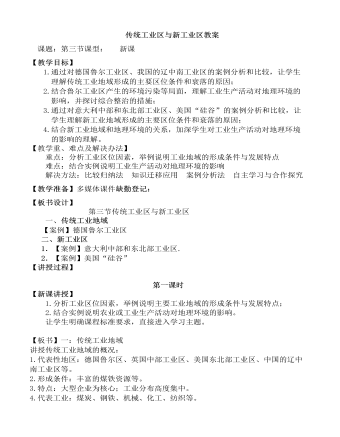
人教版高中地理必修2传统工业区与新工业区教案
1.通过对德国鲁尔工业区、我国的辽中南工业区的案例分析和比较,让学生理解传统工业地域形成的主要区位条件和衰落的原因;2.结合鲁尔工业区产生的环境污染等局面,理解工业生产活动对地理环境的影响,并探讨综合整治的措施;3.通过对意大利中部和东北部工业区、美国“硅谷”的案例分析和比较,让学生理解新工业地域形成的主要区位条件和衰落的原因;4.结合新工业地域和地理环境的关系,加深学生对工业生产活动对地理环境的影响的理解。【教学重、难点及解决办法】重点:分析工业区位因素,举例说明工业地域的形成条件与发展特点难点:结合实例说明工业生产活动对地理环境的影响解决方法:比较归纳法 知识迁移应用 案例分析法 自主学习与合作探究 【教学准备】多媒体课件缺勤登记:
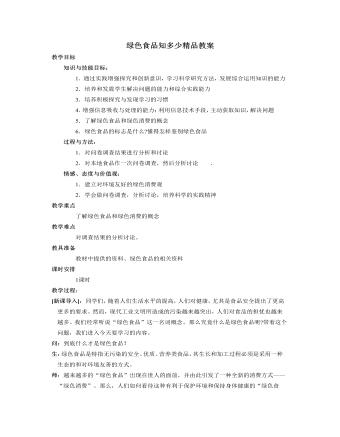
人教版高中地理必修2绿色食品知多少精品教案
生1:加强对绿色食品的宣传和扶持力度。当前的形势迫切要求我们发展绿色食品,因为绿色食品是真正实现可持续发展的,做到了发展经济和环境保护相结合,而且有利于增进人民身体健康。但目前绿色食品在市场上难成气候,主要是宣传和扶持不够。生2:绿色食品对环境、生长过程、加工过程以及运输等过程都有很严格的要求,很多环境相对优良的地区都是边远落后地区,必须给予政策上的扶持和优惠,才能降低成本,市场发展前景才会更加广阔。活动与探究对当地绿色食品市场情况作调查并初步分析。活动的实施过程:1.确定调查研究的目标并制定调查研究的计划。市场调查要深入广大消费者,可以去市场上做调查,‘对象包括消费者和经营者。形式可以是问卷,也可以是现场采访。弄清楚被调查者对绿色食品的态度,是否了解食用绿色食品的意义,是否懂得鉴别绿色食品等。对象力求涉及各个年龄段,多种职业。2.对问卷调查进行整理、分析,得出结论。

人教版高中地理必修2传统工业区与新工业区精品教案
③在萨斯索罗地区集聚的相关企业和服务性机构有哪些?④萨斯索罗瓷砖工业小区的生产—销售—服务网络中支撑企业、辅助性企业、服务性企业、服务性机构有哪些?学生回答问题后教师小结:意大利的新工业区,以中小企业集聚的工业小区为独特的发展模式。工业小区的优势是有助于加强专业化,提高生产效率,降低生产成本,增强在市场上的竞争力。完成课本70页活动:1. 比较温州乡镇企业与意大利新工业区的发展有什么异同(相同:有大批廉价劳动力,企业规模小,以轻工业为主,企业生产高度专业化,资本集中程度低。不同:最大的不同是意大利工业小区密切联系协作,共同形成巨型企业,温州虽生产同种产品,但是联系协作不如意,形成多家企业竞争局面,规模效应大减。)2. 温州乡镇企业的发展有哪些些问题?你能为其解决这些问题提出合理化的建议吗?(加大技术投入,企业间联系协作,杜绝恶性竞争等)
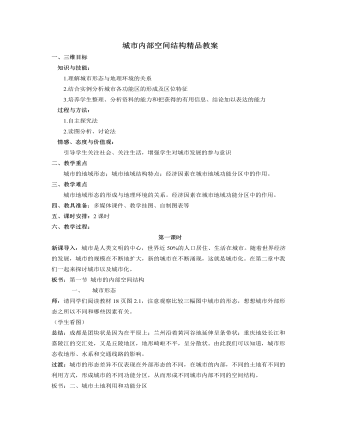
人教版高中地理必修2城市内部空间结构精品教案
过渡:在实际生活中,城市内部空间结构并非完全按照这一经济规律呈现,而是更具复杂性。这说明除了经济因素外,还有很多其他因素在起作用,请大家结合你的认识、图2.9和案例1:纽约市的少数民族区谈谈你的看法。(2)其他因素I.收入 —— 形成不同级别住宅区的常见原因。有能力支付昂贵租金和选择最佳居住环境的人,其居住地往往形成高级住宅区。II.知名度 ——城市内某些地区在历史、文化或经济方面具有很高的声誉,这往往会吸引更多新的住宅或商场建在该处,以提高其知名度。III.种族聚居区的形成 ——在有些城市的某一区域内,如果某个种族或宗教团体占优势,就可能形成种族聚居区。如纽约市的唐人街、哈林区、小意大利区等。IV历史因素——城市的建筑物和街道设计可以维持久远,早期的土地利用方式对日后的功能分区有着深远的影响。3、城市内部空间结构的形成和变化

新人教版高中英语必修3Unit 1 Festivals and Celebrations-Reading for Writing教学设计一
The topic of this part is “Write about your festival experience”.During the Listening and Speaking and Talking, students are just asked to say out their festival experiences such as the Spring Festival, Mid-autumn Day, but this part students will be asked to write down their own festival experiences. During the reading part, it introduces the Naadam Festival in Inner Mongolia Autonomous Region, which can give students a good example to imitate. Students not only learn the festival, but touch and feel the Inner Mongolian’s character, the spirit and cultural atmosphere, which can help students form the cultural awareness and learn to enjoy and value the diversity of Chinese culture.Concretely, the dairy tells the experience that the author spent the Naadam Festival in Inner Mongolia Autonomous Region with his/her friend. The structure is clear. In the opening paragraph, it introduces the topic of the Naadam Festival and the whole feeling. Then it introduces the items of the festival like the ceremony, wrestling and horse racing. Finally, it summarizes this experience. Because this part is a travel journal, we must guide students pay more attention to these details: 1. use the first person. 2. use the past tense to tell the past thing and use the present or future tense to describe the scenery. 3. use the timeline to tell the development. 4. be careful for the author’s psychology, emotion and feeling, etc.1. Read quickly to get main idea; read carefully to get the detailed information about Naadam Festival.2. Learn the structure of the reading article and language.3. Write an article about a festival experience4. Learn to use the psychology, emotions and feeling in the writing.1. Write an article about a festival experience.2. Use the structure of the reading article and language.

新人教版高中英语必修3Unit 3 Diverse Cultures-Discovering Useful Structure教学设计
Step 4 PracticeRead the conversation. Find out which words have been left out.Justin: Linlin, I’m going to Guizhou Province next month. I’m super excited! Any recommendations for places to visit?Linlin: Wow, cool! Guizhou is a province with a lot of cultural diversity. Places to visit...well, definitely the Huangguoshu Waterfall first.Justin: What’s special about the waterfall?Linlin: Well, have you ever heard of the Chinese novel Journey to the West ?Justin: Yes, I have. Why ?Linlin: In the back of the waterfall, you will find a cave, which is the home of the Monkey King.Justin: Really? Cool! I’ll definitely check it out.Linlin:And I strongly recommend the ethnic minority villages. You’ll find Chinese culture is much more diverse than you thought.Justin:Sounds great, thanks.Answers:Justin: Linlin, I’m going to Guizhou Province next month. I’m super excited! Do you have any recommendations for places to visit?Linlin: Wow, that’s cool! Guizhou is a province with a lot of cultural diversity. What are some places to visit in Guizhou ? Well, definitely the Huangguoshu Waterfall is the first place to visit in Guizhou Province.Justin: What’s special about the waterfall?Linlin: Well, have you ever heard of the Chinese novel Journey to the West ?Justin: Yes, I have heard of the Chinese novel Journey to the West . Why do you ask if I have heard of the Chinese novel Journey to the West?Linlin: In the back of the waterfall, you will find a cave, which is the home of the Monkey King from Journey to the West.Justin: That’s really true? It’s Cool! I’ll definitely check it out.Linlin:And I strongly recommend the ethnic minority villages on your trip to Guizhou Province. You’ll find Chinese culture is much more diverse than you thought it was.Justin:This all sounds great, thanks.

新人教版高中英语必修3Unit 5 The Value of Money-Discovering Useful Structures导学案
4.They were going to find someone to take part in their bet when they saw Henry walking on the street outside.[归纳]1.过去将来时的基本构成和用法过去将来时由“would+动词原形”构成,主要表示从过去某一时间来看将要发生的动作(尤其用于宾语从句中),还可以表示过去的动作习惯或倾向。Jeff knew he would be tired the next day.He promised that he would not open the letter until 2 o'clock.She said that she wouldn't do that again.2.表示过去将来时的其他表达法(1)was/were going to+动词原形:该结构有两个主要用法,一是表示过去的打算,二是表示在过去看来有迹象表明将要发生某事。I thought it was going to rain.(2)was/were to+动词原形:主要表示过去按计划或安排要做的事情。She said she was to get married next month.(3)was/were about to+动词原形:表示在过去看来即将要发生的动作,由于本身已含有“即将”的意味,所以不再与表示具体的将来时间状语连用。I was about to go to bed when the phone rang.(4)was/were+现在分词:表示在过去看来即将发生的动作,通常可用于该结构中的动词是come,go,leave,arrive,begin,start,stop,close,open,die,join,borrow,buy等瞬间动词。Jack said he was leaving tomorrow.
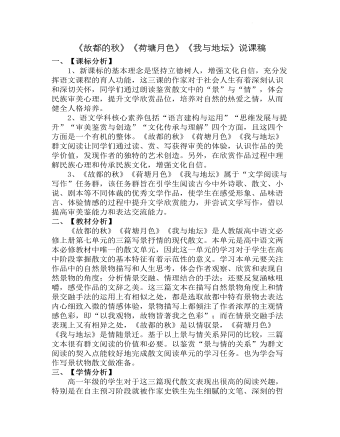
《故都的秋》《荷塘月色》《我与地坛》群文阅读说课稿 2022-2023学年统编版高中语文必修上册
(2) 中国文人的悲秋情结。3.《荷塘月色》中,作者为什么要离开家来到荷塘散步?4. 思考:作者的心里为何“颇不宁静?”(教师补充:写作背景)5. 出门散步后,作者的心情发生变化了吗? 有怎样的变化?6.思考讨论:为什么作者说“我”与“地坛”间有着宿命般的缘分,二者有何相似之处?(阅读1-5段)7.思考:作者从他同病相怜的“朋友“身上理解了怎样的”意图“?三、课堂总结李白说:“天地者,万物之逆旅也。”人生,如同一场旅行,在人生的旅途中,时而高山,时而峡谷,时而坦途,时而歧路。我们或放歌,或悲哭,然而,大自然始终以其不变的姿势深情地看着我们,而我们,也应该学会在与自然的深情对望中,找到生命的契合。正如敬亭山之于李白,故都的秋之于郁达夫,荷塘月色之于朱自清,地坛之于史铁生,他们从中或得到心灵的慰藉、精神的寄托,或得到生存的智慧与勇气,最终完成精神的超脱。
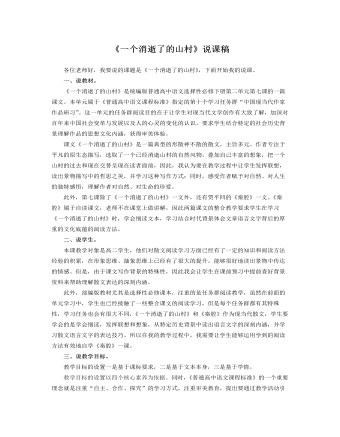
《一个消逝了的山村》说课稿 2021—2022学年统编版高中语文选择性必修下册
这几段内容传达出的是“要敬畏生命,尊重生命;更要敬畏大自然,尊重大自然,爱护大自然”的主旨内涵,因此让学生通过自由朗读的方式,再次体会冯至对这个消逝了的山村的细致的美好的描绘,感悟冯至传达出的对生命,对自然的理解和思考。5.最后一个自然段的解读依然是交给学生,先齐读课文,再让学生自主分享自己的体会或疑惑。但在这一环节我也设计了两个我认为必须解答的两个问题,一是怎么理解“在风雨如晦的时刻”;二是“意味不尽的关联”是指什么。我认为这两个问题一个涉及到写作背景,一个涉及到对全文主旨的一个整体把握,能够进一步帮助学生理解散文的深刻内涵和主旨,让学生有意识的在阅读散文过程中通过背景知识进行理解。既尊重学生的个性化解读,又能够让学生有意义学习,完成预设的教学目标。如果学生没有提到这两处,那我就需要做出补充。

